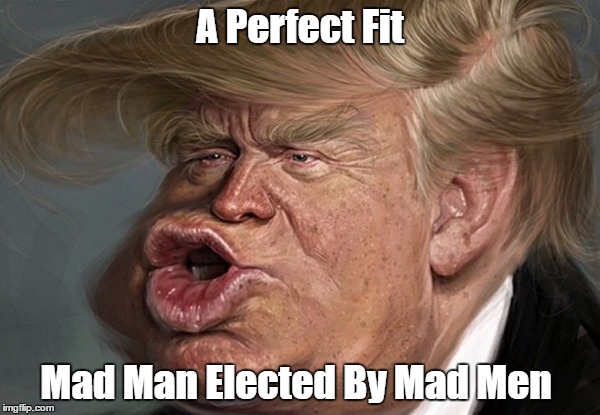
The Mad Man
 |
|
|
 | |
 |  |
| Trump keeps trying to pick winners and losers – from the bailout for farmers to a border wall contract | ||||||||||||
The president continued his pattern of picking winners and losers on Thursday afternoon when he unveiled a $16 billion bailout to help farmers offset losses from the trade war he started, and which he continues to escalate, with China. This is on top of the $12 billion in emergency cash he made available last July. The substance of Trump’s announcement at the White House, in which he was flanked by more than a dozen farmers, was entirely overshadowed by his own theatrics. Angry that Speaker Nancy Pelosi claimed he threw a “temper tantrum,” the president told reporters: “I’m an extremely stable genius, okay?” Standing in front of the press corps, Trump asked five of his aides to tell everyone how “very calm” he had been when he walked out of a meeting the day before. “You were very calm,” replied Larry Kudlow, the president’s top economic adviser. The new bailout Trump introduced is significant and merits scrutiny. Make no mistake, these are government handouts. And few conservatives who purport to support free markets are objecting. The politics are a no-brainer. Trump cannot win reelection without the farm belt. He narrowly prevailed in 2016 because of overwhelming strength in rural areas that depend on agriculture. Indeed, the Chinese have targeted farmers to cause political pain for the president so that he’ll cave in negotiations. As soon as Trump slapped tariffs of 25 percent on $250 billion of Chinese imports, Beijing retaliated with import taxes on U.S. agricultural commodities such as soybeans, which tend to be grown in places the president is depending on in 2020. Trump began his 47-minute appearance in the Roosevelt Room by noting that farmers have supported him. He said it was a “great honor to be here with … people that have been with me from the beginning.” “They’re patriots. They stood up and they were with me,” the president said. “I'm very honored to have done this for you.” The long riff that followed underscored the degree to which Trump sees the presidency as transactional. He seems to think he deserves credit for making the government cut checks to save farmers after pursuing policies that have pushed them toward insolvency. Never mind that there would be no need for this bailout if he hadn’t picked a fight with not just China but also allies like Mexico, Canada and Europe. It’s been 15 months now since Trump declared that “trade wars are good, and easy to win.” He tweeted that the morning after announcing a 25 percent tariff on steel and a 10 percent tariff on aluminum.
Trump proceeded to tout initiatives he’s taken to help corn growers. He noted that he directed the EPA to make it easier to sell more ethanol in vehicle fuel, lifting summertime fueling restrictions on E15 gasoline, which means it contains as much as 15 percent ethanol. Iowa is the nation’s top producer of both ethanol and corn. Most economists can explain to you why this is shortsighted economic policy, not to mention deleterious for the environment. “The people in Iowa, and lots of other places, are very happy,” he declared yesterday afternoon. “I made a promise during the campaign that I was going to do it. I don't know if it had an impact, but I won Iowa by a lot.” -- Not everyone is getting government handouts. The brewers, for instance, haven’t received any bailout. America’s beer industry yesterday blamed the Trump tariffs for the loss of 40,000 jobs. Metal tariffs imposed by Trump have boosted the cost of aluminum cans, leading to declines in investment, a new report by two trade groups showed, per Bloomberg News. -- Bigger picture, Trump has pursuedsomething that at times feels akin to a 1950s-style national industrial policy. He’s tried to revive steelmakers and domestic manufacturers with tariffs. He’s vetoed foreign investments. He’s publicly pressuring the Federal Reserve to lower interest rates. He has used the bully pulpit of the presidency to attack individual companies, and even corporate executives, by name. Among other things, Trump went after Nordstrom’s for dropping his daughter Ivanka’s clothing line. Treasury Secretary Steven Mnuchin disclosed during congressional testimony on Wednesday that he’s personally been haggling with corporate executives about prices. He said he spoke with the chief financial officer of Walmart after the company warned that customers will need to pay more for furniture and other goods because of the Trump tariffs. To put it mildly, this has not historically been the role of the treasury secretary. At least in America. Commerce Secretary Wilbur Ross has been given immense power over whether to grant waivers to exempt companies from tariffs.This gives government the ability to favor somecompanies and industries and punish others. 
A farmer plants soybeans yesterday in a field in Springfield, Neb. (Nati Harnik/AP)
-- It’s Economics 101: Central planning like this has never worked in the long run because it distorts incentives, and no bureaucrat setting prices in Washington can outsmart markets. Cliometricians can debate until the cows come home, but the free market – as much as anything else – is why we won the Cold War. The Soviets just couldn’t keep up.“Trump's snap decision to send billions of dollars in new aid to farmers could be bad for the farm economy and the federal budget,” Politico food and agriculture reporter Catherine Boudreau reports. “Many farmers are still deciding what to plant this spring and could be swayed toward crops that receive higher payouts from the aid package, such as soybeans. That would add to already record supplies and further depress prices that have been falling for five years. Agriculture Secretary Sonny Perdue, who weeks earlier denied the White House was discussing another round of aid so soon after a $12 billion bailout last year, suddenly interrupted a trip to South Korea to announce a second program. “Sen. Chuck Grassley, an Iowa Republican, told reporters Wednesday that the White House should have been more cautious about the timing of the announcement because farmers are still planting. ‘We want farmers to make decisions on how many acres of corn and soybeans to plant based on the market and not something the government’s doing,’ he said. … Rainfall in the Midwest has delayed planting, so many farmers can still switch up their crops. Even the prospect of another round of trade assistance could encourage them to plant more soybeans.” -- “The new relief plan aims to avoid problems that arose in the first aid package, when soybeans received what many believed was a disproportionate amount of the money, while corn received only a penny a bushel. Other producers were shut out entirely from relief payments,” Laura Reiley, Colby Itkowitz and Annie Gowen report. “The bulk of the payments will be set aside for row crops such as alfalfa, wheat and oats, which will be paid at a single rate according to the number of acres planted in each county. More niche crops, including tree nuts, sweet cherries, cranberries and grapes, will also be eligible for relief, depending on tariff impacts. Dairy and pork producers also stand to receive relief under the system. Distributing relief funds by-county, and not by commodity, will hopefully discourage farmers from planting crops that would be more lucrative in aid money.” 
President Trump poses for photos in the Oval Office on Thursday after announcing a bailout for farmers. (Jabin Botsford/The Washington Post)
-- But the Trump bailouts are often not going to the farmers who need them the most. Jeff Stein reported last November about some of the people who got money from the first, $12 billion round of bailouts: “Scott Yocom is a 48-year-old architect who lives in Manhattan, works at an office building near Times Square, and has been recently consumed with designing a new central terminal at LaGuardia Airport in Queens. But late last month, Yocom received a government check worth about $3,300, a payment that came courtesy of a Trump administration program aimed at helping farmers hurt by the U.S.-China trade war. Yocom said he spends two weeks a year on his family farm in Ohio, but as a part-owner he was eligible for the bailout funds. Yocom was one of at least 1,100 residents of the 50 largest U.S. cities who has received bailout funds from the Agriculture Department, according to USDA data.”Consider this story published last week by the New York Daily News: “The Trump administration has forked over more than $62 million — taxpayer cash that was supposed to be earmarked for struggling American farmers — to a massive meatpacking company owned by a couple of corrupt Brazilian brothers. The Department of Agriculture cut a contract in January to purchase $22.3 million worth of pork from plants operated by JBS USA, a Colorado-based subsidiary of Brazil’s JBS SA, which ranks as the largest meatpacker in the world. … Previously undisclosed purchase reports … reveal the administration has since issued at least two more bailouts to JBS, even as Trump’s own Justice Department began investigating the meatpacker, whose owners are Joesley and Wesley Batista — two wealthy brothers who have confessed to bribing hundreds of top officials in Brazil. Both brothers have spent time in jail over the sweeping corruption scandal.” -- Despite these and many other problems so far, most conservatives on Capitol Hill were more muted in their response to the second round of agriculture bailouts than the first. It’s another proof point of the degree to which Trump’s takeover of the GOP has made the party more protectionist, even mercantilist, in its outlook. “Last year, some Republican senators were incensed by such a move, Sen. Ben Sasse (R-Neb.) compared it to ‘golden crutches’ aimed at ‘making it 1929 again’ and then Sen. Bob Corker (R-Tenn.) questioned why ‘there isn't an outright revolt in Congress right now,’” Jackie Alemany notes this morning. “But Corker retired and Sasse is running for reelection, plus other Republican senators view the decision to go after China as worthwhile even if it means an economic gut punch for farmers and other industries in the interim.” Sasse did not release a statement yesterday.
|





No comments:
Post a Comment